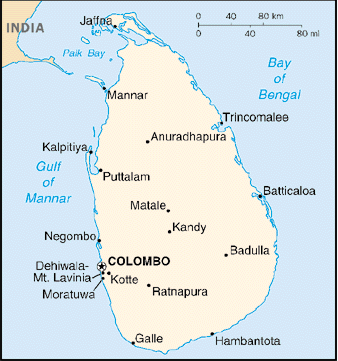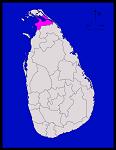(Maps and related text added by Axis of Logic)
27 December 2008
As the Sri Lankan military continues its offensive to capture Kilinochchi, in the northern Wanni district, the death toll on both sides has risen sharply. The army has concentrated two divisions around Kilinochchi, the administrative centre of the separatist Liberation Tigers of Tamil Eelam (LTTE), but its attacks were driven back last week.
No independent reports are available and both sides routinely exaggerate casualty figures. On Monday, the LTTE claimed to have killed 100 soldiers and wounded another 250 in repelling an attack from Uruththiyapuram, to the south of Kilinochchi. The defence ministry reported that it had killed 40 LTTE fighters in several clashes near Kilinochchi on December 25.
Since Sri Lankan President Mahinda Rajapakse restarted the war in July 2006, the LTTE has lost its strongholds in the East and the western half of the Wanni. The fall of Kilinochchi would not only be a political blow but open the way for the military to focus on the LTTE's last remaining major centre—Mullaithivu on the north-eastern coast.
Even according to Sri Lankan military reports, the LTTE is putting up stiff resistance to prevent the fall of Kilinochchi and Mullaithivu. The defence ministry claimed this week that the army had entered the town of Mulliyawalai, to the south of Mullaithivu.
 |
|
 The Kilinochchi district is shown in pink in the map on the right. It is immediately south of the Jaffna Lagoon. It is the northern-most one of the 25 administrative districts of Sri Lanka. It is is administered by a District Secretariat headed by a District Secretary (previously known as a Government Agent) appointed by the central government of Sri Lanka. But most of the district is controlled by the separatist LTTE (Tamil Tigers). The headquarters is located in Kilinochchi town. The district was carved out of the southern part of Jaffna district in February 1984. In November 2008, the Sri Lankan Army launched an attack on Kilinochchi from three directions. - sources: various in Wikipedia The Kilinochchi district is shown in pink in the map on the right. It is immediately south of the Jaffna Lagoon. It is the northern-most one of the 25 administrative districts of Sri Lanka. It is is administered by a District Secretariat headed by a District Secretary (previously known as a Government Agent) appointed by the central government of Sri Lanka. But most of the district is controlled by the separatist LTTE (Tamil Tigers). The headquarters is located in Kilinochchi town. The district was carved out of the southern part of Jaffna district in February 1984. In November 2008, the Sri Lankan Army launched an attack on Kilinochchi from three directions. - sources: various in Wikipedia
|
LTTE spokesman B. Nadesan told the BBC on Monday that the group would continue to fight even if Kilinochchi fell: "Freedom... never depends on one city. We can create more communities, more cities and [in] our freedom struggle, we are supported by people," he said. Previously, the LTTE has dismissed reports that the army could capture the town.
President Rajapakse is desperate for a victory as a means of diverting discontent over deteriorating living standards and attacks on democratic rights. His government has exploited the war as the means for suppressing political opposition and insisting that working people sacrifice for the military effort.
Defence spokesman Keheliya Rambukwella told the media on Wednesday: "The president is very mindful that no civilian is hurt in the ongoing battle. That is why the crawl to Kilinochchi by the forces has been very slow." In fact, the military has repeatedly used indiscriminate aerial bombing and artillery barrages to terrorise the civilian population in LTTE-held areas.
For months, the government and the military have been declaring the capture of Kilinochchi was imminent. According to last weekend's Sunday Times, foreign journalists gathered in Colombo after being tipped that a final thrust was about to take place. Some 7,000 troops were thrown into the offensive on December 23, but confronted stiff resistance and were forced to pull back. Most foreign reporters have now left.
Our correspondents spoke to several wounded soldiers who are now being treated in a government hospital in Colombo. A continuous stream of wounded soldiers can be seen at hospitals in Colombo. As the major hospitals fill up with new arrivals, some of the wounded are transferred to other hospitals in the surrounding suburbs.
The WSWS spoke to soldiers at several hospitals. While most were unwilling to give a full interview, they were clearly weary of the war and fearful for the future. Officers in and out of uniform have been deployed to the hospitals to prevent journalists from approaching the wounded.
"We all want to see the end of this war. See this ward. All of my colleagues in this ward have become disabled in their youth. Every one of them has lost at least one limb. I have lost my right leg," one soldier told our reporters.
"I am from a village near Anuradhapura [in the north central province]. We are from farming families. We are spending our youth fighting in the jungle for this war. We didn't have the choice that young people from rich families have. Now we will spend our lives disabled," he said.
"Despite our poverty and unemployment, my parents opposed my decision to join the army. Now I think that they are correct," he said.
A corporal with 13 years' service explained the situation on the battlefront. He said that new recruits with only three months' training were being sent to the battlefront. Commenting on the intensity of the fighting, he said: "During last couple of months, the battalions have had to continuously move forward without any break. We are ordered to ‘Go forward even an inch'.
"In some confrontations, we were compelled to leave not only the dead but the wounded too. Their heartrending voices are always echoing in my ears. The Tigers [LTTE] know that they cannot win the war and they are desperate. But it seems they won't give up. This is the brutality of the battlefield. We want to see an end to this [war]," he said.
WSWS reporters visited the family of Lance Corporal G. Suresh in the village of Dunuwila in the central hill district. He was just 20 when he was killed on November 9 in the battle for Kilinochchi.
Dunuwila is a difficult village to reach. There is no proper road. The villagers do not earn enough through their traditional cultivation of crops such as coffee, cocoa, cloves, and nutmeg. So many young people have been driven to join the military.
Suresh's parents live in a thatch house roofed with tin sheeting. His father is a carpenter and his elder brother is a construction worker. His two young sisters are still studying. Suresh stopped his studies and joined the army in order to earn the money to build a new house and to enable his sisters to study and marry.
Suresh worked at several places after leaving the school but quit those jobs because the pay was poor. He finally joined the military, ignoring his father's objections. "Anything might happen to me. But you will get something," Suresh had told his father.
Suresh joined the army this year, finished his training in October and was attached to the Gajaba regiment. Suresh telephoned his mother on October 24, saying: "We have been asked to go the front lines, but do not know which area I am going to."
His mother angrily told the WSWS: "Why after such short training like this was he put into the fighting. Even to drive a vehicle one needs some training. My son died young because of this war. The government is responsible for his death."
http://www.wsws.org/articles/2008/dec2008/sril-d27.shtml

